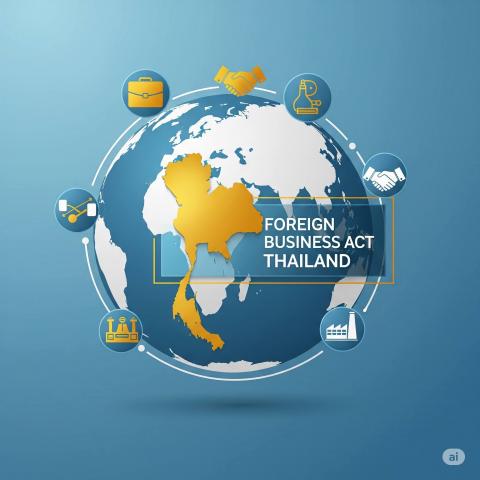As Thailand and the United Kingdom move forward with negotiations for a landmark Free Trade Agreement (FTA), many foreign entrepreneurs and investors are watching closely. This potential agreement aims to build on the existing Enhanced Trade Partnership (ETP) and could unlock significant new opportunities for businesses operating in the Kingdom. This guide explains what the FTA is, its potential benefits, and how you can prepare.
What is the Thailand-UK Free Trade Agreement?
A Free Trade Agreement (FTA) is a treaty between two or more countries to reduce or eliminate certain barriers to trade and investment. For Thailand and the UK, an FTA would mean lowering tariffs (import/export taxes), streamlining customs procedures, and creating clearer rules for investors and service providers.
The goal is to make it easier, cheaper, and more predictable for UK businesses to operate in Thailand and vice versa. The negotiations cover a wide range of areas, including goods, services, digital trade, and investment, aiming to create a modern and comprehensive trade deal.
Potential Benefits for UK Businesses and Expats in Thailand
A successful FTA could bring substantial advantages for the foreign community in Thailand, particularly for those involved in business and investment. Key benefits are expected to include:
- Reduced Tariffs: Lower or zero tariffs on goods traded between the two countries would reduce costs for businesses that rely on import and export regulations, making UK products more competitive in Thailand and Thai products more attractive in the UK.
- Improved Market Access: The agreement could open up sectors that are currently restricted, giving UK companies greater opportunities in areas like financial services, technology, and professional services.
- Simplified Customs Procedures: Streamlined and digitized customs processes would mean faster and more efficient movement of goods, reducing administrative burdens and delays.
- Greater Investment Protection: The FTA is expected to include provisions that protect the rights of investors, creating a more secure and stable environment for those looking to invest in property or businesses.
- Enhanced Digital Trade: Modern rules on digital trade and data flows would support the growing tech sector, making it easier for e-commerce and digital service companies to operate across borders.
Key Sectors to Watch
While the benefits will be widespread, certain industries are particularly poised to gain from the Thailand-UK FTA:
- Automotive and Manufacturing: Reduced tariffs on car parts and finished vehicles could boost this key sector.
- Food and Drink: Easier market access for agricultural products and beverages would benefit both Thai food exporters and UK specialty product importers.
- Financial and Legal Services: UK firms could see fewer barriers to offering their expertise in Thailand's growing services market.
- E-commerce and Technology: Clearer rules on digital trade will support online businesses and tech startups.
How Can Your Business Prepare?
While the final terms of the agreement are still under negotiation, businesses can take proactive steps now. It is wise to review your current supply chains, assess how tariff reductions could impact your pricing strategy, and explore new market opportunities. Understanding the legal framework for setting up a company in Thailand is the first step to positioning your business to capitalize on these future benefits.
The team at PS Law & Business is closely monitoring the FTA negotiations. We provide clear, straightforward legal solutions to help foreign entrepreneurs navigate the complexities of Thai commerce. Whether you need advice on corporate structuring, licensing, or contracts, we are here to help.
FAQ
When will the Thailand-UK FTA be signed?
There is no official date yet. Trade negotiations are complex and can take time. Both governments are aiming to make significant progress, but a final agreement is likely still some time away.
How is this different from the Enhanced Trade Partnership (ETP)?
The ETP, launched in 2022, was a preliminary step to explore trade opportunities and resolve market access barriers. The FTA is a much more comprehensive and legally binding agreement that will formalize and expand upon the groundwork laid by the ETP.
Will this affect my visa or work permit?
While the FTA's primary focus is on trade and investment, it could include provisions related to business mobility. However, existing requirements for things like a Thailand work permit will likely remain under the purview of national immigration law.
Will the FTA make it easier for foreigners to own property?
The FTA will focus on investment protection, which could make investing in property more secure. However, it is unlikely to change the fundamental Thai laws regarding foreign land ownership. Foreigners can still own condominiums freehold.
Further Reading
- Negotiations on Thailand-UK FTA set to start
- Thailand's Department of International Trade Promotion (DITP)
If you have questions about how the upcoming Thailand-UK Free Trade Agreement could impact your business, contact PS Law & Business today for a consultation.




